America Needs Elections We Can All Believe In
America Needs Elections We Can All Believe In
An impartial perspective on US elections
Our Election Integrity Google group was recently interviewed for a Politico Magazine feature, “What Happened to the Democrats Who Never Accepted Bush’s Election.” Author Joanna Weiss shows that once people come to see the U.S. election system clearly, trust in it is about as likely to return as a child’s belief in Santa Claus once that is understood as fantasy. She then asks an important question overlooked by the rest of the national media,
‘What happens now that that tens of millions of Trump supporters no longer believe?’
I offer an answer, but first I address several issues raised in the article about how we know what we know, the overlooked role of elections, and the state of Election Integrity. One of my doctoral students observed that:
1. There are almost no objective voices on the topic.
2. The country would listen to objective people if they existed.
Well, we exist. We want to help. Please read. React. Respond. Check us out. Join us.
About “Election Integrity”
Politico’s purpose was not to re-visit the 2004 election; nevertheless it implies that we were driven by “conspiracy theory” rather than solid evidence. At various points, Weiss casts the issues in terms of “belief,” when quite the opposite is true.[1]

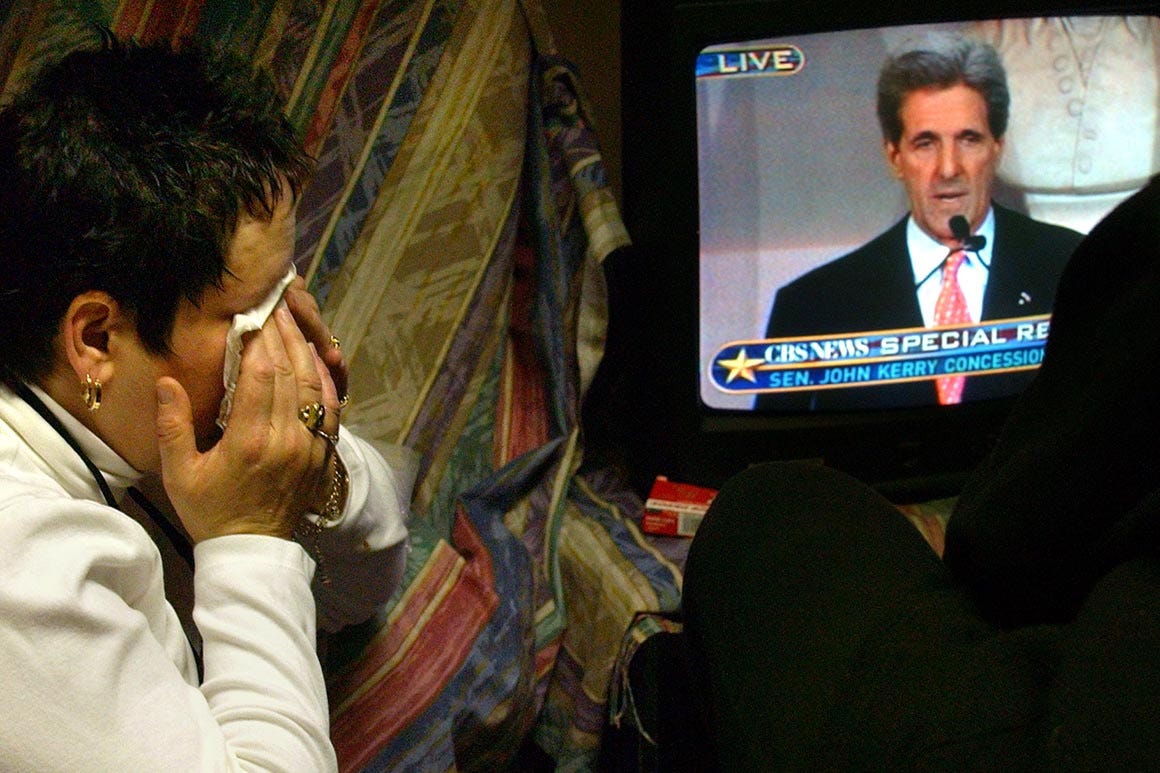
The article opens, “Steven Freeman felt, in his bones, that something was wrong with the election.” Not at all! [2] My original concern was an Unexplained Exit Poll Discrepancy. (Survey methods is one of my areas of professional expertise.) As a group we have always been scrupulously data-driven.
The picture of the female Kerry voter sobbing before the television is likewise misleading and demeaning. I doubt that a single tear was shed for John Kerry from among our 400 members. More apt would be a graphic from a presentation I gave to the American Statistical Association comparing how easy it was (and still is!) to rig a voting machine as compared to a Las Vegas slot machine:

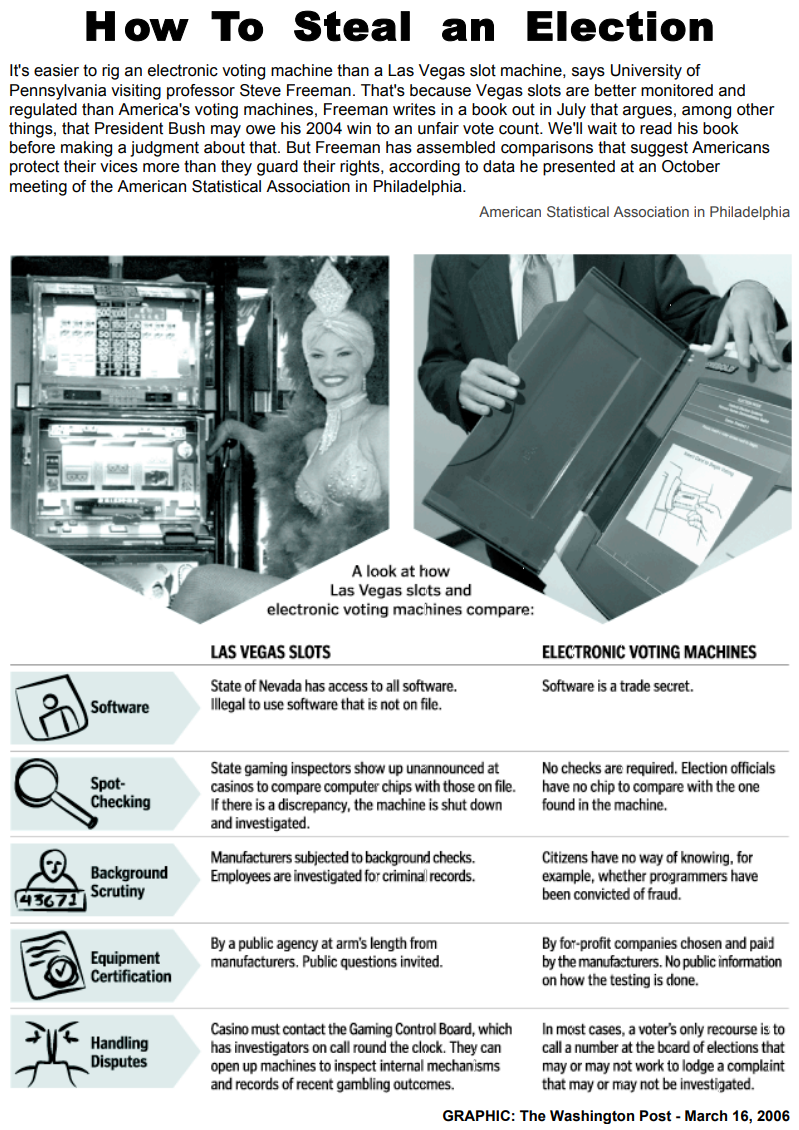
When Weiss introduces the subject of voting machines, she goes on to say,
“It was all impossible to disprove, because it was impossible to prove: If the numbers defied explanation, then any idea, however uncomfortable or wild, could theoretically be true.”
This statement is confusing, misleading and fundamentally incorrect.
Proof of Election Fraud
It took time, but we did prove that the 2004 election was stolen. It began with exit poll analysis. Until the 2000 election and the introduction of electronic voting, early voting, and widespread vote-by-mail, the only concern about exit polls were that they were too accurate! As two leading political scientists put it, “The problems with exit polls lie in their accuracy (rather than inaccuracy). They give the press access to predict the outcome before the elections have been concluded.” Around the world, exit polls had been used to verify the integrity of elections. Discrepancies between exit polls and the official vote count had been used to successfully overturn election results in Serbia, the Republic of Georgia, Peru, and that very month, in Ukraine.[3]


The 2004 U.S. exit poll data indicated results far, far beyond the statistical margin of error. We then conducted a dozen hypothesis-tests while systematically considering every possible alternative explanation. We also conducted machine analyses, vote change analyses, and down-ticket comparisons . The numbers could only be explained by one thing: widespread fraud. We also found extensive physical evidence of falsified voting records, ballot manipulations, misreads, misfeeds, as well as machine corruption, all of which provided additional support for exit poll results rather than official numbers.
In 2004, Bush officially carried Ohio, the state he needed for electoral college victory, by 118,601 votes; but quantitative studies indicate that had votes been counted as cast, he would have lost Ohio by several hundred thousand votes. And this doesn’t even include the many disenfranchised because of registrations denied, voting machine shortages and other manipulations that prevented Kerry strongholds from voting.[3a] For those who don’t trust statistical analyses, one resolute researcher, Richard Hayes Phillips, collected ballots throughout Ohio, took pictures, and actually did count the votes. Long before he ran out of resources to complete the state, he had already documented enough manipulations to turn the result twice over.[3b]
But proving fraud is difficult and, above all, takes time!
What I did say in my Politico interview was that, given the opacity of US elections and all the obstacles to uncovering truth, proof would seem nearly impossible in the span of a few weeks following the election. The 2004 election analyses took many months (years for Phillips’ study), and that was with unusually apt professional expertise, great exit poll data (no longer very useful) and confidential conversations[4] made possible, perhaps, by John Kerry’s swift “cordial” abandonment of his pledge to make sure every vote would be counted.
*Disproving* Fraud and the Purpose of Elections
As for Politico’s assertion about fraud being “impossible to *disprove*,” nothing could be further from the truth!
Almost incredibly, the entirety of American political establishment seems not to understand the foremost purpose of elections!
Elections are important to anoint winners, but even more important to assuage the losers and thereby maintain a civil society. Fair and open elections provide an opportunity for all to have their say, even run for office, and have a fair chance to prevail. Under these conditions, if the electorate chooses otherwise, those who lose can accept that they now must abide by the outcome — that they’ll have a chance again in the next election, but that, repeat, they now must abide by the outcome.
Nothing about the 2020 US Presidential election comes close to meeting this essential purpose. In the Foreword to my book on the 2004 election, U.S. Representative John Conyers, Jr., former chair of the House Judiciary Committee wrote,
… More than simply reflecting the desires of the majority, Hamilton insisted that the electoral process afford a “moral certainty.” Elections needed to convey a sense of fairness and finality if the fledgling democracy was to survive.
How to Afford Moral Certainty
In the current context, such moral certainty may sound like a tall order, but in fact, it’s remarkably easy. All it takes to disprove election fraud is to do what every actual democracy — Germany[ii], Norway, Netherlands, France[iii], Canada[iv], United Kingdom, Ireland, Spain, Portugal, Italy, Denmark, Sweden, Finland and many others — actually does [5a]:
1. In-person voting at the polls on Election Day Absentee voting should be restricted. For those abroad, polling places should be established at embassies, consulates and military bases. [+, explanation, details]


2. Paper ballots filled out in ink. [+]

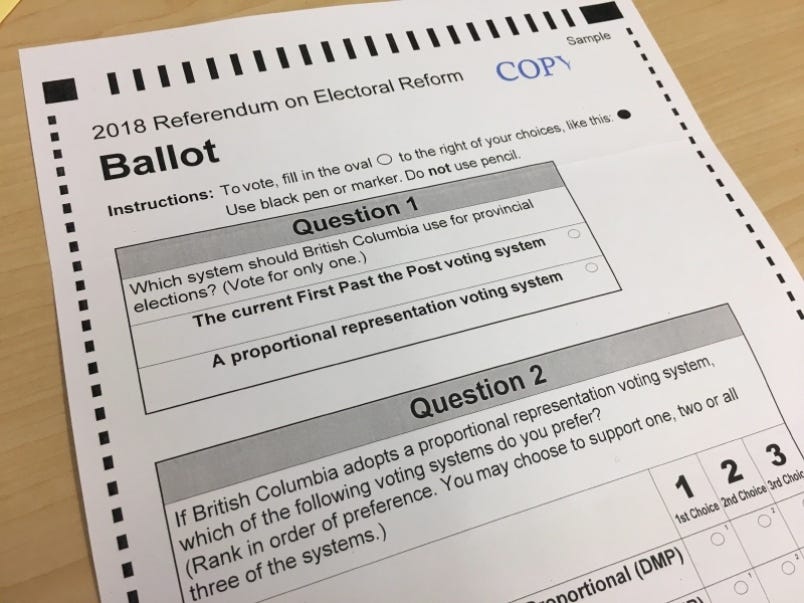
3. Poll watchers representing all parties and candidates ensured a full and effective view of the entire election process (+)
4. Ballots cast in secure boxes in full view with unbroken chain-of-custody (+)

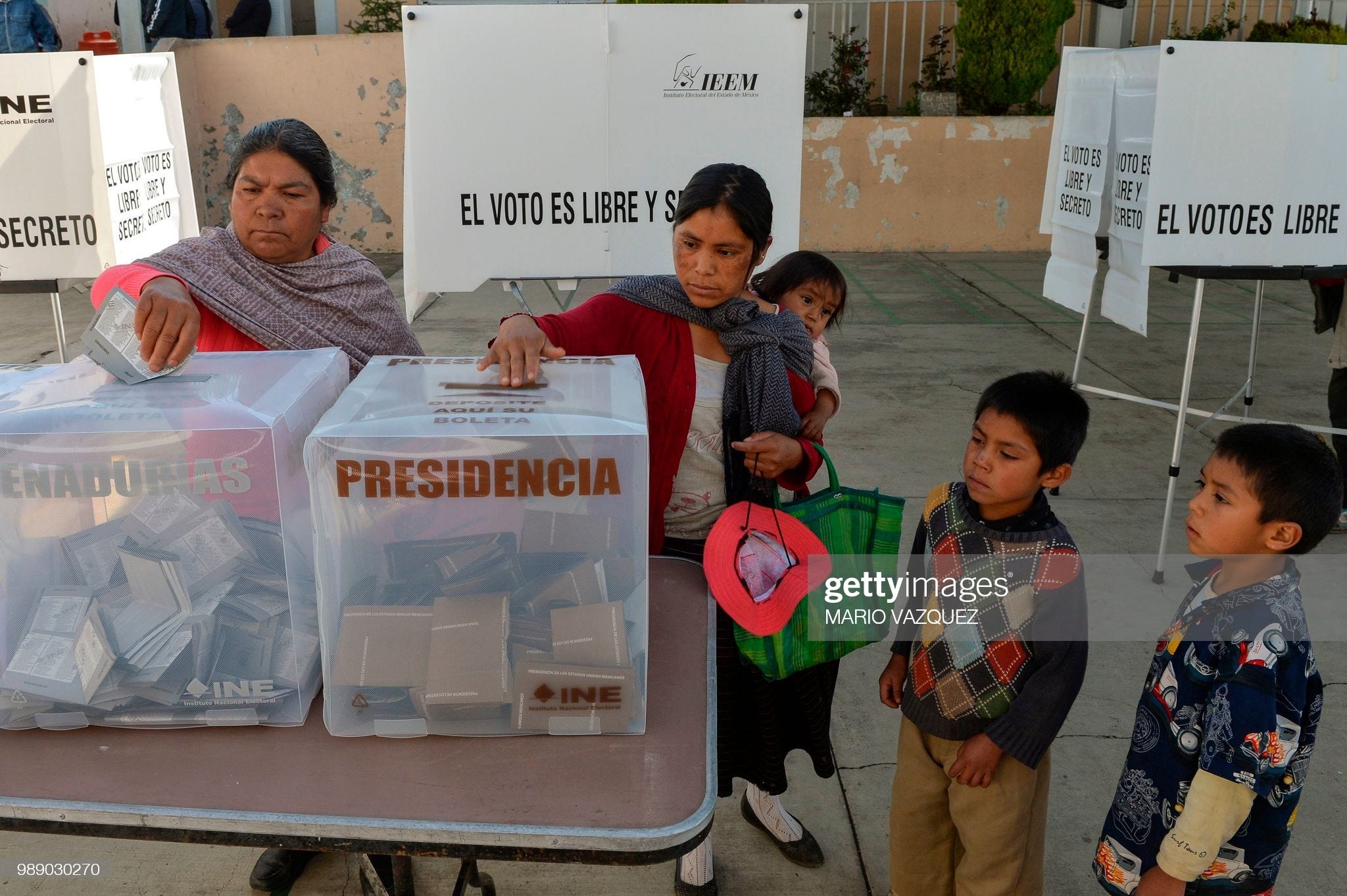
5. Hand counts of all ballots at the local polling place (not the central county facility), immediately upon close of voting (+).

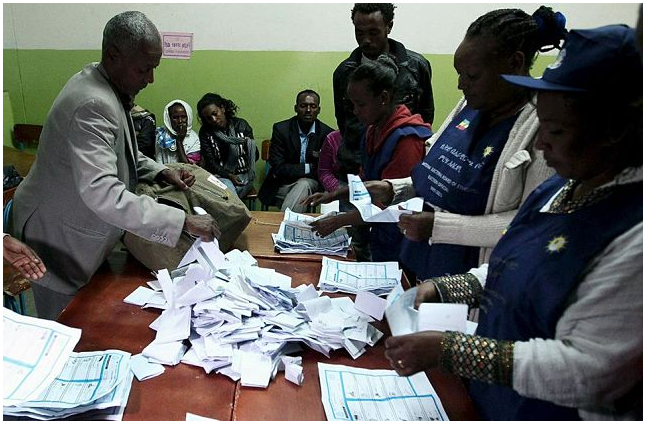
6. Tallies posted on polling place doors and online immediately upon completion of the count.(+)
7. Election results comprise the sum of tallies from each individual polling place.(+)
Burden of Proof
One approach to establishing fair elections is to do pretty much the exact opposite of what’s currently done in America. This begins with reversing the burden of proof. As Paul Lehto is quoted in the article, we need to say “ ‘OK, prove Biden won,’” Alas, for that he acknowledges, “there is no proof … It’s just numbers that popped out of computers.” I had written of the 2004 election:
You shouldn’t have to presume a fair count. The mainstream media has … established … a Catch-22 for election investigation. No investigation without proof — but then, what proof can be had without investigation?
The American public has a right to be skeptical about whether there was a fair count … and to have their skepticism proven wrong by overwhelming evidence. In any functioning democracy, this test would consistently be met without stirring controversy. … Given any of the many transgressions and statistical improbabilities in the 2004 presidential election, we have an obligation to question it. And those responsible have an obligation to investigate. Inquiry does not destroy a democracy, but rather strengthens it. (Freeman, et al 2006: pp 202–203)
One could substitute “2020” for “2004” in this passage without edit. The one difference is that transgressions have not been mitigated but multiplied. In 2004, US political theater had been a one-act farce of machine “counts” and “recounts” in which the same stack of paper or electronic ballots are fed through the same machine thus never confirming the integrity of either. The 2020 full color production includes a month-long opening act of trust in the well-lubricated machinery of state and local government operating massive, hastily orchestrated vote-by-mail and early voting. An after-vote weekend celebration concludes with the fall of an iron curtain separating audience (you and me) from the actual players.
Meanwhile, both conventional and social media restriction on election reporting have overreached to a level that even a Stalin would envy. Both before and after the election, any discussion of election vulnerabilities and evidence of fraud has been blocked by search engines, msm and social media “fact checkers” as “baseless” (media word of the year!). Even the actual sitting President has been denied media coverage and court venues to make his case. Are the claims true and sufficient to have flipped the result? Who knows? All that anyone who has looked for themselves at the evidence does know is that the claims are not baseless. [6]
The assertion that “this was the most secure election in U.S. history” repeated quite literally ad nauseum is Orwellian Newspeak. By almost any meaningful measure, the 2020 election appears the least secure; for extent and creative variety of security shortcomings, one would be hard pressed to find an historical equal. If in doubt, simply view the legislative hearings, join our EI Google or Facebook group, or search on Gibiru and click on “censored content.”
The Impact of “Election Integrity”
Given the state of American elections, one might conclude that the efforts of our little Election Integrity group are almost comically ineffectual. Many aspects of the article seem to underscore this impression — an eccentric “splinter group” of impotent intellectuals “sitting at home running regression models …open to theories [about] unseen power brokers in dark shadows …” Perhaps true in part, but the larger truth is that the presence of obvious patent fraud such as occurred repeatedly in elections this century entails that there are such power groups that need to be exposed but are instead being protected by the political establishment
We are hardly “antagonistic to the system writ large.” We don’t believe in empty assertions, but we do believe in democracy and we care about America. Those in the group do not make a penny from this; the extrinsic rewards do not justify the costs and risks, but we do it anyway because we care about truth and we care about freedom. If Miller and I wonder about our footage on election fraud being purged, it’s not from petty vanity, but from fear of a realized Ministry of Truth, that YouTube is openly rewriting history. (By the time you read this, you may have to use Gibiru and click on “censored content” even to learn about the 1876 US Presidential election.)
We have had impact. In 2004, as Weiss observes, electronic voting machines were mostly accepted as new, improved Democracy 2.0. When we began our crusade and founded Election Integrity, the term was uniquely ours. Now it’s everywhere (I should have trademarked it). And even if 99% of the time it’s used with utter cynicism (looking at you Facebook!) people at least now know to no longer take official “results” for granted.
We’ve had greater success abroad, where democracy had not yet so deteriorated that electorates were already disempowered. Testimony that I provided to election integrity advocates in Ireland led to that nation scrapping voting machines entirely in 2010. Discussions with election integrity advocates in Germany led to a 2009 ruling that every aspect of an election must be observable by the public. Analyses we provided helped stimulate and strengthen movements in Brazil, Mexico and Israel. Canadian members of our group helped strengthen restrictions in 2014 against any potential use of voting machines there.
And even here in the U.S., up against every institutional force — both national parties, most every media outlet (even alternative media), every arm of government, and for Miller and myself, our own universities — we’ve survived the most intense scrutiny. In the face of every form of censorship[8] –we’ve nevertheless helped educate the American public. When EI was born, as Michael Kinsley wrote in the New York Times book review of “Was the 2004 Election Stolen…”:
The idea that a presidential election can be stolen was the stuff of airport fiction until someone did it.
Politico characterizes us as a “splinter group [that has broken] off from the fundamental American consensus that we can trust an election” but Politico’s “conspiracy theory expert” observes that even before the 2020 election, 70% of voters from both major parties were distrustful of mail-in voting. As that number doesn’t even address growing awareness of the corruption brought on by machine and media, it would indicate an overwhelming consensus today that we cannot trust our election system. As awareness is the necessary pre-condition for action, I’d say we have been almost miraculously effective.
A Role for Election Integrity
As Weiss concludes, the tens of millions of Trump supporters who do not believe the election results will not quietly fold themselves back into the system.” Add to those tens of millions Bernie and Tulsi supporters, millions more who refuse to support either major party, the solid plurality who even this year did not vote (or openly sold their votes), and many others who like our Jonathan Simon say that at least this time they stole it to get rid of Trump. All told, that’s an overwhelming majority who can now be said to embrace Simon’s perspective that “What we’re dealing with here, although the formality is all in place, is a stuffed animal, not a real animal — a taxidermic model of democracy.” We are no longer a democracy in any meaningful sense, and without trust there’s no reason to expect it will be governed as such.
During his confirmation hearings for Supreme Court Chief Justice, John Roberts acknowledged that the right to vote “is preservative of all other rights.” Without the power to elect our representatives, and especially, to vote out of office those who misuse power — ultimately, we have no rights at all.
We are already seeing the breakdown of those rights. The only hope for their restoration is in clean elections.
And, yes, there are some objective people working on this topic. You would not know it from media or search engines, but we do exist. We want to help. Use us. Sign our petition. Join us.
Footnotes and references for America Needs Elections We Can All Believe In
Election Integrity
Paper Ballots / Process Transparency / Election Day Voting / Democracy-Building / Education
Expertise: crisis preparedness, resiliency, innovation, research methods & applications. Faculty Jefferson, UPenn+. PhD MIT. Advising industry, govnt, orgs, YOU


“….Elections We Can All Believe In…..” Can be obtained
when we up-grade our constitutions (fed, state) and
our election laws (fed, state, local) to recognize and
honor all voters’ constitutional prior-rights of their 32
Full Voting Rights.
Thanks and Good Luck.